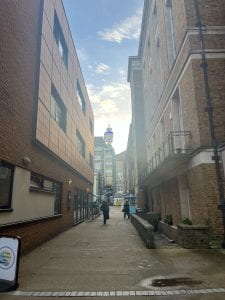Classes are over now, shockingly fast might I say. I don’t think anyone fully explained how UCL structures its terms back when I was applying, or if anyone did, I just didn’t believe them. So if you are someone scrolling through this blog looking for actual information about what’s going on over here, look no further (that being said, you do have to look a little further, at least to the bottom of this page, so you can finish reading this post). Term 1 was the fall semester equivalent so it is irrelevant for my purposes. Moving right along, Term 2 is from January to the end of March where there are 10 weeks of standard programming with a reading week halfway through intended for midterm prep. Then there is Easter break for around a week before the start of Term 3. Now it depends on which department you are in, but as far as I can tell, this is largely a fake term. Term 3 runs from the end of April to June, and it seems to be solely dedicated to final assessments. For STEM-y people that includes in-person exams, but for some humanities schmuck like me (no offense, none taken) it just determines essay deadlines. I have 3 essays due at the end of April, and then my UCL responsibilities are at an end. So yes, there really are only 10 weeks of class.
Unlike Whitman, departments here are incredibly siloed. Individual departments do things differently, and people largely take classes solely from their own department. Although this is not something I’m generally in favor of given that from the age of 5 onwards everyone around me has only sung the praises of interdisciplinary education, at a school the size of UCL it does mean that certain faces become familiar between multiple classes and everyone shares similar points of references. I took 3 classes with the School of European Languages, Culture, and Society (SELCS), a department that encompasses a good chunk of language learning classes but also has a whole slew of other more tangentially related classes. The UCL catalog has an overwhelming number of classes, but that is limited by the department you enroll in and by the fact that not all classes are open to affiliates. In my mind, the three classes I took in the SELCS department were essentially more specific English classes. One was about detective fiction, one focused on utopian and dystopian literature, and one was more broadly about the portrayal of conflict in writing. My fourth class was an art history class focusing on queer narratives in modern and contemporary art in London. This class was meant for people outside the department and took place at a different London museum each week. The art class ended up being mostly other Americans studying abroad while the others mostly included UCL students and occasionally international study abroad students. The 3 SELCS classes each had an hour-long lecture with everyone in the class and then an hour-long seminar (with at most 15 people) every week, but the art class was simply a 2-hour site visit. In general, the classes felt similar to Whitman’s aside from the separation between lecture and seminar.
Each class I took was solely assessed by the 2 essays. The UK education system apparently doesn’t penalize lack of participation in the same way I am used to, and that does affect the way people engage with the class. Nobody ever talks in lectures anyway (the only sound they make is the furious clacking of keys), but in the seminars there is definitely a different attitude toward participation. That is not to say that nobody participates, but some people will talk, and some won’t. It’s all about the essays. All the lectures, readings (meant to be read before the seminars), and seminars are in aid of giving you the background necessary to write the paper. Assessments are submitted anonymously and passed through the department’s professor and an external examiner. And, in an amusing move, the grading system here starts each score at a 0 and you earn points instead of the American attitude of starting with 100% and getting deducted. So if you crawl your way up to a 70 from a 0, you get an A. Well done.
So to get to the proverbial meat of it, yes, there are differences in the academic culture, but not in a way that provides much of an obstacle. Of course, I can’t speak for another department, but the actual academic tasks asked of the students boil down to the same things we have always been asked to do at Whitman. Ok, you can stop looking any further now.

Approaching Campus

Walking on Campus

Writing an essay on the main portico steps
